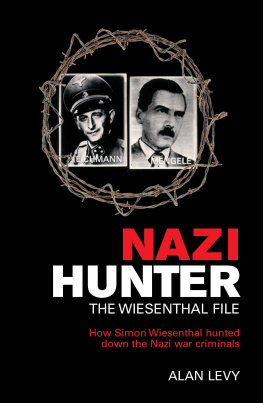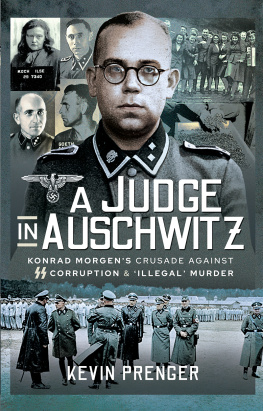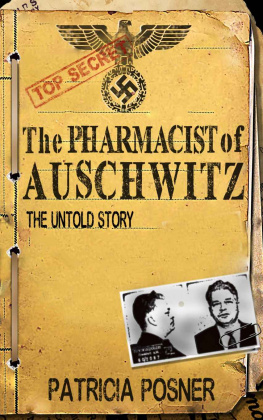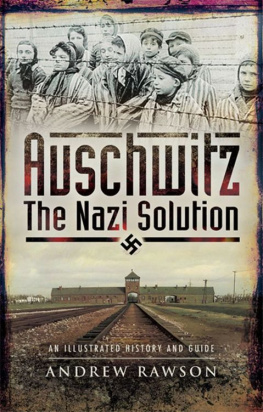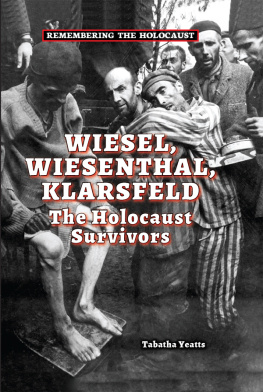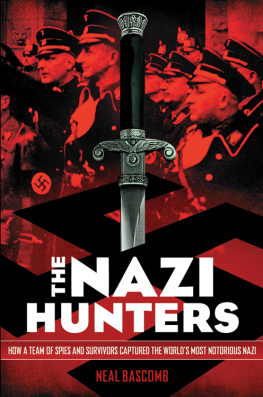A LAN L EVY was born in New York City in 1932 and educated at Brown University and the Columbia University Graduate School of Journalism. After seven years as a reporter for The Louisville Courier-Journal and another seven years freelancing in New York, he took his family to Prague in 1967 on an assignment to adapt a play for director Milo Forman. Rowboat to Prague, Levys eyewitness account of the 1968 invasion of Czechoslovakia (published in England as So Many Heroes), was hailed by Newsweek as the definitive book about a tiny nations hope and tragedy, written with an intimacy of detail and emotion that transcends mere journalistic reporting. For it, he and his family were expelled and deported in 1971. After nearly two decades in Vienna, Alan Levy returned to Prague in late 1990 and, the following autumn, became the founding editor-in-chief of a pioneering English-language weekly newspaper, The Prague Post. When this book was first published in England in 1993 as The Wiesenthal File, it was on Best of the Year lists for the Good Books Guide and The Observer. Published in America a year later, it earned Levy the 1995 Author of the Year award from the American Society of Journalists & Authors.
Praise for The Wiesenthal File:
Wiesenthal has played his part in a disturbing episode of post-war history. He deserves this readable and intelligent book.
Norman Stone, The Times
This biography of famed Nazi-hunter Simon Wiesenthal is so well written that it often seems like a thriller.
Kirkus Reviews
Levy is ruthless in his determination to make every act of barbarity clear. It is impossible to turn the pages without feeling not just despair but revulsion... A valuable addition to the literature of Nazi atrocities.
Caroline Moorehead, New Statesman & Society
There is scarcely a page from first to last when one does not flinch, take a deep breath and consider what it is to belong to the species that could bring such nightmares on the world... Alan Levy writes affectingly and simply of great tragic matters.
Simon Ward, Literary Review
This moving account... is filled with Wiesenthals outspoken comments and impromptu recollections... As much suspense and high drama as a thriller.
Publishers Weekly
His approach to Wiesenthal is fair minded and critical.
International Herald Tribune
[This book] should be read, lent, and referred to.
Observer
The Wiesenthal File is more than the sum of its parts. It throws light on themes such as the nature of evil, and is also a portrait of a man the author knows intimately and obviously admires.
Emma Klein, The Tablet
[A] thorough, objective book... compellingly detailed.
Good Book Guide
Alan Levys biography presents us with the real Wiesenthal, warts and all. It is a candid exploration of a man whose image as an avenger of the Holocaust has, in the popular mind, reached almost biblical proportions.
Bernard Josephs, Jewish Chronicle
Levy recounts the complex events so skilfully that the book does full credit to Simon Wiesenthal... one of the most readable fact-bulging Holocaust reports yet... [a] dark, disturbing and brutally honest volume.
Austria Today
Despite the books sober topic, the author packs in revealing anecdotes and rich detail that capture the ironic humour of Wiesenthal.
American Booksellers Association, Bookmans Weekly
Alan Levy can write of truly horrendous acts of inhumanity with clarity and restraint.
Fergus Pyle, Irish Times

Constable & Robinson Ltd
3 The Lanchesters
162 Fulham Palace Road
London W6 9ER
www.constablerobinson.com
First published in the UK as The Wiesenthal File by
Constable Publishers 1993
This revised edition first published in the UK by Robinson,
an imprint of Constable & Robinson Ltd 2002
Reprinted 2005, 2006
Copyright Alan Levy 1993, 2002
The right of Alan Levy to be identified as the author of this work has been asserted by him in accordance with the Copyright, Designs and Patents Act 1988
All rights reserved. This book is sold subject to the condition that it shall not, by way of trade or otherwise, be lent, re-sold, hired out or otherwise circulated in any form of binding or cover other than that in which it is published and without a similar condition including this condition being imposed on the subsequent purchaser.
A copy of the British Library Cataloguing in
Publication data is available from the British Library
ISBN 1-84119-607-X
ISBN 978-1-84119-607-7
eISBN 978-1-47210-800-5
Printed and bound in the EU
10 9 8 7 6 5
To
Cyla and Simon Wiesenthal
and to
Lisa Keloufi
born 3 September 1993
and to
Mlina Keloufi
born 26 September 1996
Illustrations
between pages 180 and 181
between pages 372 and 373
Prologue: Anti-Semitism without Jews
Bregenz, the capital of Austrias westernmost province, the Vorarlberg, is less than two hours and seventy-seven miles by train from Zrich, Switzerland, but, to the federal capital in Vienna, it is an all-day trip of almost 500 miles on the crack Bodensee Express. Settling into the dining car with Austrias weightiest daily, Die Presse, in hand in the early 1970s, a gentleman in his sixties was paired for breakfast with a Vorarlberger in his twenties who boarded in Bludenz almost an hour later, when there were no empty tables left. Discovering that the man opposite him was reading the other side of his paper, the older man was amused and asked, before turning the page, if he was finished. Flustered, the younger man tried to pretend he wasnt reading the others paper, but he accepted when his neighbour said hed finished the first section and wouldnt he like to look at it?
The Vorarlberger punctuated his reading of the news with interpretive comment: Another traffic detour in Innsbruck! Those Jews in City Hall are always messing things up for the rest of us.... The price of gas is going up! Its all because of what the Jews have done to the Arabs.... A bomb went off in the South Tyrol! The Italians say German extremists did it, but its all the work of the Jews.
There are still Jews in the South Tyrol?, the older man wondered gently.
You cant believe what you read in the papers anyway, the Vorarlberger replied. Theyre all run by Jews! Passing through some of the most gorgeous mountain scenery in the world, the older man tried not to focus on the ugliness he was hearing.
Finally, though, he could bear it no more, so he asked: Do you know any Jews?
Of course not! the man replied proudly. I am from Bludenz, where there are no Jews.
Would you ever sit at a table with one?
Certainly not!
Well, youre just as wrong about that as youve been about everything else youve said today. You just had breakfast with a Jew.
The man stood up spluttering Waiter! Waiter! I want to pay.
But I havent brought you the second coffee you ordered, the waiter protested.
Thats all right. Ill pay for it, the man insisted, thrusting an exorbitant tip at him and exiting in haste.
Simon Wiesenthal reflected on the encounter all the way home. That night, over dinner, he told his wife Cyla and a couple of friends about it. The next morning, he went to the Austrian National Library and did a little research before writing a feuilleton for the
Next page
